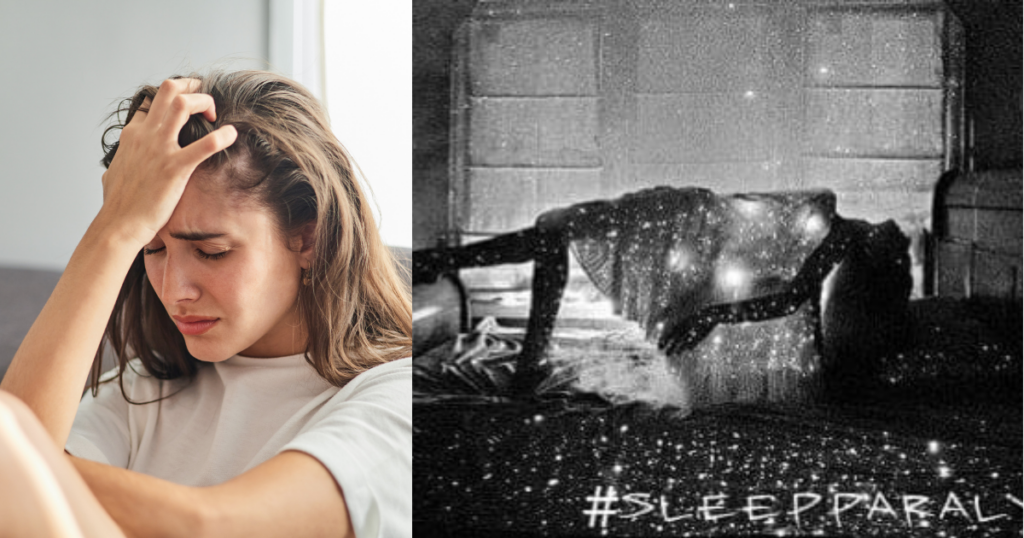The answer is yes, anxiety can be a contributing factor to sleep paralysis. Here’s how:
- Stress and Sleep Disruption: Anxiety often leads to difficulty falling or staying asleep (insomnia). Disrupted sleep patterns can increase the risk of sleep paralysis.
- Heightened Arousal: When you’re anxious, your body remains in a state of high alert. This can make it harder to fully transition between sleep and wakefulness, creating the conditions for sleep paralysis to occur.
- Vivid Dreams and Nightmares: Anxiety can trigger vivid dreams and nightmares, which can sometimes blur the line with reality during sleep paralysis, making the experience even more frightening.
Can anxiety cause sleep paralysis? This is a question that has intrigued many, especially those who have experienced the unsettling phenomenon of sleep paralysis. In this article, we will explore the relationship between anxiety and sleep paralysis, and how stress can potentially lead to this frightening experience.
What is Anxiety?
Anxiety is a natural response to stress or danger, characterized by feelings of worry, fear, or nervousness. It is a normal part of life, but it can interfere with daily activities and overall quality of life when it becomes excessive or persistent.
What is Sleep Paralysis?
Sleep paralysis is a phenomenon in which a person is temporarily unable to move or speak while falling asleep or waking up. It is often accompanied by a feeling of pressure on the chest, hallucinations, and a sense of dread.
Link Between Anxiety and Sleep Paralysis

Research has shown that there is a strong link between anxiety disorders and sleep paralysis. People with anxiety disorders are more likely to experience sleep paralysis, and the frequency and intensity of sleep paralysis episodes are often higher in those with anxiety disorders.
How Anxiety Can Lead to Sleep Paralysis
Anxiety can disrupt the normal sleep cycle, leading to fragmented sleep and an increased likelihood of experiencing sleep paralysis. Additionally, anxiety can trigger the body’s “fight or flight” response, leading to heightened arousal during sleep and an increased risk of sleep paralysis.
Living with Anxiety and Sleep Paralysis: Managing Both Conditions
If you’re experiencing both anxiety and sleep paralysis, there are steps you can take to manage both conditions and improve your sleep quality.
Here are some tips:
- Practice Good Sleep Hygiene: Establish a regular sleep schedule, create a relaxing bedtime routine, and ensure your bedroom environment is dark, quiet, and cool.
- Manage Stress: Techniques like meditation, deep breathing exercises, and progressive muscle relaxation can help reduce anxiety and improve sleep quality.
- Cognitive Behavioral Therapy (CBT): CBT can be a powerful tool for managing anxiety and improving sleep. A therapist can teach you techniques to identify and challenge negative thought patterns that contribute to anxiety.
- Medication: In some cases, medication may help manage anxiety and improve sleep. Talk to your doctor about the best options for you.
Other Factors Contributing to Sleep Paralysis
While anxiety is a significant factor in sleep paralysis, it is not the only one. Genetics, sleep disorders such as narcolepsy, and substance use can also contribute to the likelihood of experiencing sleep paralysis.
Coping Strategies for Anxiety-Induced Sleep Paralysis
Managing anxiety is key to reducing the likelihood of experiencing sleep paralysis. Techniques such as cognitive behavioral therapy, relaxation techniques, and stress management can be effective in reducing anxiety and improving sleep quality.
FAQs
How do I stop anxiety paralysis?
Stopping anxiety-induced sleep paralysis can be challenging, but several strategies may help:
- Manage Stress and Anxiety: Practice stress-reduction techniques such as mindfulness meditation, deep breathing exercises, or yoga to help reduce anxiety levels.
- Improve Sleep Hygiene: Maintain a regular sleep schedule, create a relaxing bedtime routine, and ensure your sleep environment is conducive to restful sleep.
- Limit Stimulants: Avoid caffeine, nicotine, and other stimulants close to bedtime, as they can interfere with sleep.
- Address Underlying Anxiety: Seek support from a mental health professional to address underlying anxiety disorders that may be contributing to sleep paralysis.
- Create a Relaxing Bedtime Routine: Engage in relaxing activities before bed, such as reading a book or taking a warm bath, to help promote better sleep.
- Use Sleep Paralysis Techniques: If you do experience sleep paralysis, try to remain calm and focus on trying to move a small part of your body, such as a finger or toe, to help break the paralysis.
- Seek Professional Help: If anxiety and sleep paralysis are significantly impacting your quality of life, consider seeking help from a therapist or psychiatrist for further evaluation and treatment.
It’s important to remember that everyone’s experience with anxiety and sleep paralysis is different, so it may take some time to find the right combination of strategies that work for you.
What stops sleep paralysis?
- Improve sleep hygiene
- Reduce stress
- Address underlying sleep disorders
- Avoid sleeping on your back
- Create a relaxing bedtime routine
- Get regular exercise
- Seek professional help if needed
Can sleep paralysis be caused by stress?
Yes, sleep paralysis can be caused by stress. Stress can disrupt the normal sleep cycle and lead to sleep disturbances such as sleep paralysis. Stressful life events, anxiety, and other forms of mental or emotional stress can increase the likelihood of experiencing sleep paralysis.
Why do I get so sleep paralysis?
Sleep paralysis can be caused by:
- Irregular sleep patterns
- Sleep disorders like narcolepsy
- Stress and anxiety
- Sleeping on your back
- Mental health conditions
- Genetics
- Substance use
If you experience frequent sleep paralysis or it impacts your life, consider consulting With Experts
Have you Ever experienced Sleep Paralysis?

Many people need support and could benefit from Hearing your story
If you Are Interested Send an Email to
Expressing your interest
Conclusion
In conclusion, anxiety can indeed cause sleep paralysis. By understanding the link between anxiety and sleep paralysis and implementing effective coping strategies, individuals can reduce the frequency and intensity of sleep paralysis episodes, leading to improved overall well-being.
Find Cyrus on Social Media

Instagram: 12stonesproductions
Linkdin: Cyrus L. Richardson
Youtube:12 Stones Productions
CyFLY :IMDb CyFLY
